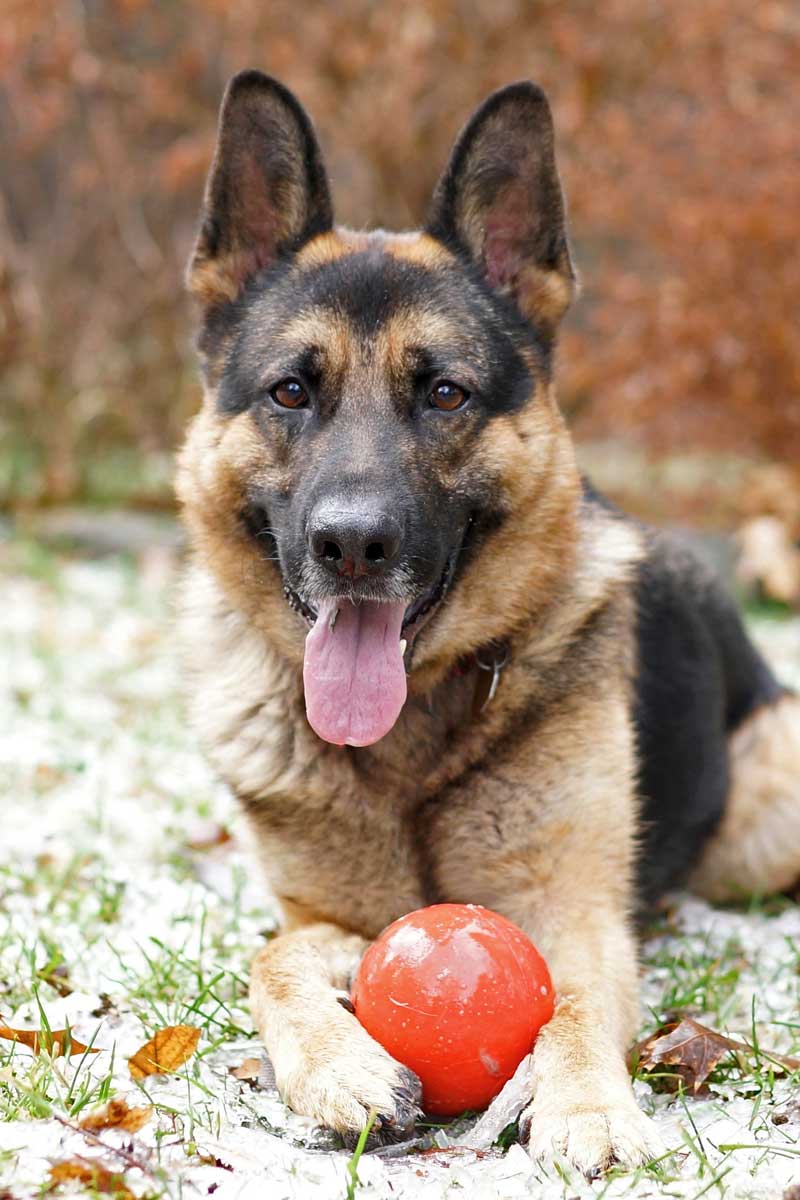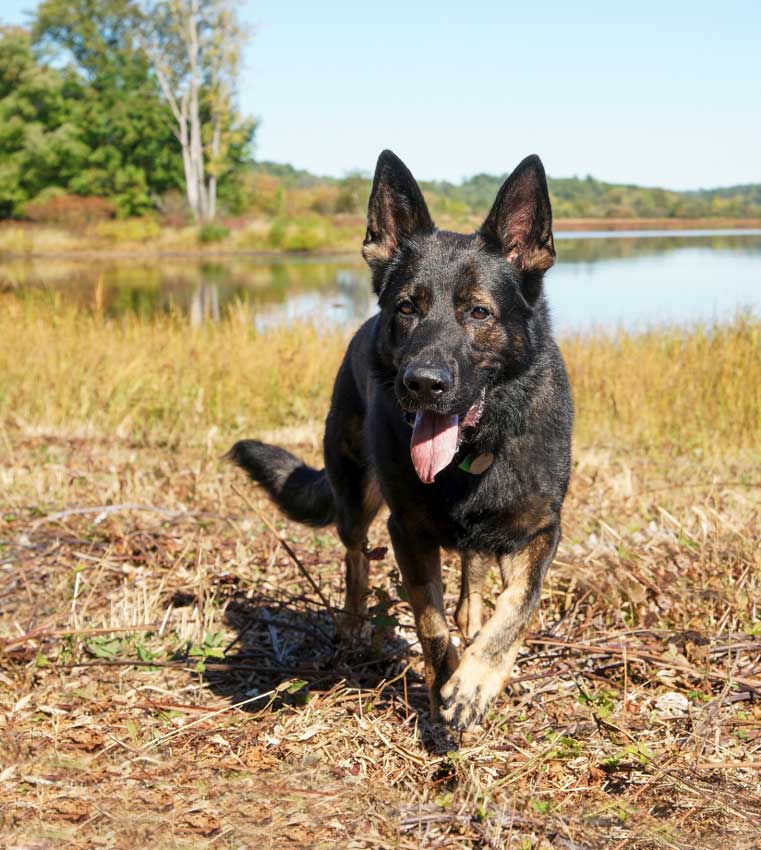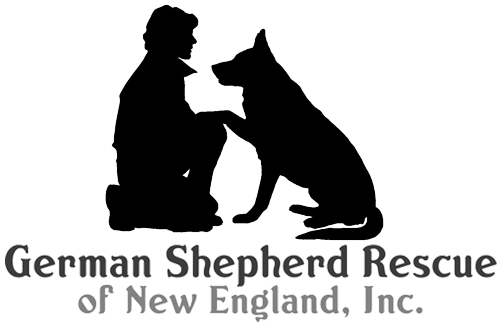ADOPT
SHOULD YOU GET A GERMAN SHEPHERD DOG?
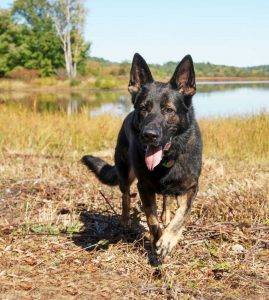
Lex
Before getting a dog, it’s best to think about your lifestyle and your family’s lifestyle.
- Are your hours at home irregular due to work or your social life?
- Do you mind having to always go home after work to let the dogs out, or staying home a lot on weekends to care for and be with your dog?
- Do you plan on traveling a lot in the near future?
- Is your time already precious to you because you have children to concentrate on and must constantly drive to lessons/practices/games already?
- Is everybody in your family excited about adopting a German Shepherd Dog, or would some rather have another breed?
- Are some afraid of large dogs?
- Are you considering getting a German Shepherd Dog as a “watch dog” because you are frequently away on business trips?
- Are you sure your spouse/partner can handle a GSD by his- herself? If not, getting a large dog for somebody who doesn’t want it or cannot handle a large dog alone could be disaster! Don’t force your opinions on your spouse/partner on this issue.
If you answer yes to any of these questions, please reconsider getting a German Shepherd Dog now. Wait until your circumstances change. You’ll be glad you did, and so will any dog you may adopt.
If you feel that your family situation and work hours are conducive to owning a dog, and in particular, a German Shepherd Dog, we’d love to talk to you about adopting a Rescue dog!
NOTE: GSRNE does not adopt out rescue dogs to families with children under 7 yrs of age. You need a fenced area attached to your home for the dog’s safety. Dogs cannot be left outside in the fenced area without direct supervision. These policies arose out of experience.
Why Should I Consider a Rescue German Shepherd Dog?
Plenty of web pages and trainers and vets in the dog world right now recommend that shelter and Rescue dogs are a great choice for ownership. They are right! These GSDs can make some of the greatest companions and pets available, plus, these are dogs that need a good home now. Many who do not find a home in time face an uncertain, sometimes deadly, fate.
Rescue dogs come from many places. Most are given up by their owners who don’t have time for them, who develop allergies to them, who get divorced and have nowhere to keep a dog, or develop financial hardships that preclude dog ownership. Many are given up because of a lack of training from the owners – these dogs get some training during their foster stays with GSRNE. Others are strays and/or are rescued from shelter situations.
GSRNE medically treats any dog that comes into our program for any known problems, as well as updating the dog on shots, testing for parasites and heartworm, and putting the dog on heartworm preventatives. The dog’s basic temperament must meet GSRNE’s guidelines before that dog is accepted into the program. Generally, most Rescue dogs have a known history, and GSRNE volunteers will try to evaluate each dog over some time to try to ascertain whether the dog appears to be good with children, other dogs, cats, etc. During this time, GSRNE volunteers also try to get a handle on the dog’s personality and needs for a successful placement in the right kind of home. We try to brush up on the dog’s housebreaking and household manners as well.
GSRNE believes in finding the right dog for the right family. This is why we have an application and interview process when you apply to adopt a dog. This process is in place to help us help you find the right dog. Personalities and breed traits vary widely in the breed, so every German Shepherd Dog out there isn’t necessarily great for every adopter. Particular types of or individual German Shepherd Dogs are just better for some people than others. Rescue groups like GSRNE can help guide you through this maze to find just the right dog for you and your family. Getting the wrong dog can be quite a travesty – it’s best to figure out what you want and what your family can handle, and then get help in finding a dog like that.
Puppy, or Adult Dog?
Puppies are adorable fluffy, cute bundles of love, there is no question. They are quite hard to resist when you look at them.
They are also extremely time-consuming and can be a lot of work, which most people just don’t expect. Puppies chew items (usually your favorite things), piddle and mess in the house, and need constant supervision. CONSTANT. They are just babies, after all! People often expect puppies to behave as if they were adult, educated dogs. This leads to frustration and disaster.
If you want a puppy, be sure you have the time and patience to deal with housebreaking, crying at night, chewed furniture and other damage a puppy can cause daily. Plan on having no real time for much of anything else you enjoy doing because you must supervise the puppy, for months.
Another point about puppies is, you never know how a puppy will look when it grows up, or its general personality until that dog reaches around 18-24 months old. And don’t forget the puppy energy level. That often doesn’t level off until the dog is between 2 and 3 years old!
If you get an adult dog, you can see the dog’s general personality, and you can also see a mature version of him. Most adult dogs are very adaptable and most will adjust well to your home. Adult dogs can and do bond to new owners quite readily. In fact, German Shepherd Dogs want to bond to an owner strongly, and are very willing to do so to the first person who shows them love and caring. You still need to provide structure, love, and training for an adult dog, as you would for any dog you raise, but the puppyhood chores are over for the most part with most Rescue dogs. And we cannot emphasize greatly enough how wonderful that is.
Puppies are handed over to GSRNE sometimes, but it is a rare occurrence. Most dogs accepted into GSRNE are over a year old. Which is super – you’re already partway through adolescence in a 1 yr old dog. Nothing is better than a dog that is out of adolescence!
If you are looking for a nice dog that knows generally not to chew things, not to scream all night, not to mess in the house…if you’re looking for a dog that you can start obedience training and fun games with right away…for a dog that can stay home all day without a major problem…for a dog that has an adult dog’s comprehension level and attention level…if you’re looking for a dog who needs you as much as you want to want him, consider an adult Rescue dog from GSRNE!
READ NEXT: GSRNE Adoption Requirements
ADOPT YOUR NEW BEST FRIEND!
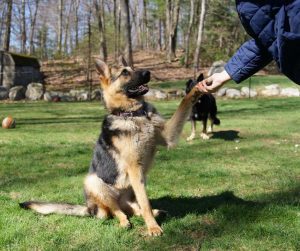
GSRNE works very hard to match the right dog with our adopters, so that you’ll be happy and our dogs will have a forever home.
We place dogs in the six New England states (ME, NH, VT, MA, CT, RI).
- The adoption fee for our dogs is: $450 for dogs over 6 months up to 7 years of age and $550 for puppies up to 6 months of age.
- $250 for seniors, age eight and older & special needs dogs.
The fees help us meet expenses incurred by our nonprofit organization, although our average expense per rescue dog is approximately $2,000 each. These include the following if they have not already been given to the dog before coming into GSRNE’s program:
Spay or Neutering
- They are all spayed or neutered prior to adoption
Vaccines:
- Distemper, Hepatitis, Leptospirosis, Parainfluenza and Parvovirus (DHLPP)
- Rabies
- Bordetella
- Lyme
Tests:
- Heartworm, Lyme, Elrichea, and Anaplasma (4DX)
- Fecal
- Complete blood panel for seniors dogs or dogs that have apparent health issues
Exam:
- Check for any apparent health issues
- Microchip implanted
Flea, Tick & Heartworm Treatment
- Flea, tick and heartworm preventatives
Grooming
- Sometimes our dogs come in needing a grooming (bath and nail clipping) and we try to have this done either before the dog goes into a foster home or when they get to the foster home if the foster home is unable to bathe the dog.
Training
- Some dogs require professional training to work on additional skills and socialization to prepare them for a happy and healthy life.
Boarding
- At times we need to board our dogs. It is usually because the dog needs out of the situation it is in and we don’t have a foster home available.
READ NEXT: Should you get a German Shepherd Dog?
REQUIREMENTS FOR ADOPTING FROM GSRNE
There are many reasons for this policy. We regret that some great homes may be passed over because of this policy, but we feel that this policy is best for everybody involved to take the dog and family’s safety into account.
GSRNE places dogs in homes with a fenced yard.
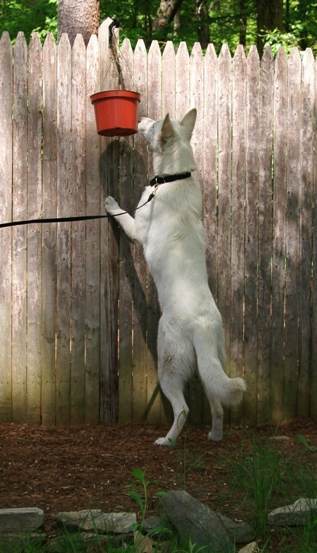
Sassy is safe in her fenced yard
Experience is the best teacher and has taught us that the safest environment for a Rescue German Shepherd includes a fenced yard or area. Generally speaking, most rescued dogs need more limitations because they need time to get to know the new owners and bond. We feel VERY STRONGLY that dogs allowed to wander unsupervised are dogs that are at a greater risk of getting lost, stolen, poisoned or struck by a car. Dogs that run loose are also at risk of exposure to rabid animals, potentially bringing this fatal disease home to the family. GSRNE requires some kind of fenced area attached to your house at the back or side door. This is to ensure the safety of the dog. Your fenced area doesn’t have to be elaborate or expensive. It does NOT have to encompass your entire yard.
The fenced enclosure is intended to guarantee a secure outdoor exercise area for the dog, but is NOT intended as a place for the dog to live. German Shepherds are highly social, people-dogs and need to be with you to be happy.
Placement: Location of the fenced area should also be taken into consideration. It needs to be attached to your house at the back or side door, so it will ensure an increased measure of safety for your dog and prove a convenience for you. It should include a lockable gate. A fence along a sidewalk or road needs to be set back at least 20 feet or be a stockade type fence.
Size: The fenced area needs to be at least 1000 square feet (for example 20’ x 50’) to provide your GSD with a comfortable, safe space in which to get some exercise and fresh air, and to eliminate, without concern of people, kids, animals or wildlife wandering into their area. Kennels or pens do not qualify, unless enclosed within a larger fenced area attached to your house. Shade and shelter from the sun and elements should also be provided as well as fresh water.
Height: We generally require at least a 5′ high fence for active dogs. We are willing to discuss a fence height exception of a 4′ fence for less active dogs.
Type of Fence: A satisfactory fence may be built of stockade, chain link, heavy wooden posts with heavy gauge wire, or metal posts with heavy gage wire, preferably with a rigid metal bar along the top. (No dog should be left unattended for any length of time in the latter type of enclosure because they are relatively easy to escape.) Equal attention should be given to the security of the fence along its bottom in order to prevent dogs from digging out.
Invisible Fencing: Major limitations of the invisible fence system are: an invisible fence does not keep out potential dangers to your dog–any dog or rabid animal may come onto your property, not all dogs can be trained to obey the system, any people coming onto your property do not have the benefit of a physical barrier between themselves and the dog, it does not keep out other dogs. This fencing is not approved because of these potential problems.
Tie-outs: The use of tie-outs or overhead runners is not safe or allowed for a German Shepherd. Dogs on tie-outs may become tangled or choke and are not able to adequately defend themselves from other dogs or animals that may enter the yard. They are easy targets for thieves, are usually not very happy dogs and tend to bark a lot. Tying out German Shepherds has been shown to increase frustration and aggression levels.
Access to the Fenced Area: GSRNE rescue dogs should only be allowed to use the fenced area when supervised, i.e. you are home or outside with the dog. Dog doors allowing your dog access to the outdoors while you are not home are also not considered safe for a rescue GSD. German Shepherds are intelligent, inquisitive dogs who should be with their families, or should be safely inside the house if nobody can supervise them. German Shepherds left outside alone even in a fenced area for long periods of time can develop problems such as digging, barking, and fence frustration at not being able to join people or dogs outside. No dog should be left unattended for any length of time in general, because it is relatively easy for the dog to escape.
Pools: If you have an in-ground pool, you must have a fence around the pool to keep your dog from falling in and drowning. We’re sorry to say that drownings have happened before, even with dogs that have spent years around pools, and we want to prevent it from happening again. Exceptions can be made if 1) your pool has graduated steps and you teach your dog how to get out of the pool using them and 2) you use a pool cover during the winter that can bear the weight of a person.
Senior or Special Needs Dogs: For some senior dogs (8 years and older) the fencing requirement may be waived. This will be approved on a case-by-case basis. We understand there are excellent adopters and dog owners that do not have a fenced yard but the fence requirement will not be waived for younger dogs.
While a secure fence is the goal of our fencing policy, a fence does not automatically make every home a good home for a rescued German Shepherd Dog. A fenced area is just a place for the dog to be off leash and safe, to get some fresh air, eliminate and to play… it is not a place for the dog to live! We regret that this policy may eliminate some homes, but our first concern must be the safety of the dogs with which we have been entrusted. Thank you for your understanding and cooperation.
Note: Dogs cannot be fostered or adopted until your fence has been inspected and all necessary repairs competed.
GSRNE places dogs in the following New England states: Massachusetts, New Hampshire, Maine, Vermont, Rhode Island, and Connecticut. If you live outside our service area, please search other GSD rescue websites for organizations outside of our area.
Thanks to Labrador Retriever Rescue, Inc. for some of the wording.
READ NEXT: If you fit all the above requirements and are interested in adopting, please go to our Adoption Process page.
BEFORE YOU ADOPT
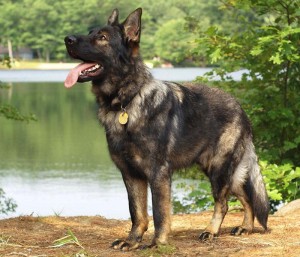
Buddy
Before you get a German Shepherd Dog, you will want to educate yourself on what the breed is like.
There are several ways to do this. Begin by reading some of the suggested material right here at GSRNE. Talk to people who own a GSD.
- Just as importantly as educating yourself on the breed, you should evaluate the following truthfully:What you want and expect from a dog as the responsible owner. This includes activity level of the dog. Don’t get a bouncy young dog when you really want a quieter dog that will be content to lie around the house all day with you.
- What the rest of your family wants and expects from a dog. This may differ from what you want. Again, consider activity level, size, sex, etc.
- What your family members can handle (which is often different from what people think they want!).
We have noted some general characteristics of these beautiful and intelligent dogs below to help you decide if a GSD would be a good fit for your family and your lifestyle.
General Characteristics of a German Shepherd Dog
The German Shepherd Dog (GSD) is a large, active dog with a double coat. This double coat sheds and sheds and sheds and sheds, year round, and produces greater volumes of fur when the dogs “blow coat” in the spring and fall. Some shed more than others, but be sure that your vacuum will become your best friend. For some owners, this is not a trivial point. Being a large dog, expect muddy paw prints in the house every time it rains.
The breed was developed for service as a herding and general purpose working animal. Their desire to “work” or do something is genetic, and is stronger in some GSDs than others. Many GSDs end up in shelters precisely because they are working animals. Their first family really just wanted a couch-potato. Think about this carefully!
Most adult GSDs are handsome, giving, loyal, active, loving, protective and intelligent. Without proper guidance and training, GSDs can be rambunctious, destructive of property, obnoxious, and exhausting to live with. It is up to you to guide your dog to suit your lifestyle and that of your family.
Many GSDs can also become overly protective/territorial if they do not receive the level of leadership in the household that they respect and want to follow. Who is really running the show in your house? Evaluate this objectively. If it isn’t you or your dog doesn’t believe it’s you, then your German Shepherd Dog will assume that responsibility himself, and will run things as a dog will, not as a human being will. (After all, he’s just a dog!) In many instances, the dog way of running the world is NOT how humans would like, and we get calls from owners about overly protective and territorial behaviors showing up and getting out of control. It all has to do with YOU.
Most, if not all, GSDs need training and a structured lifestyle to thrive and become a canine good citizen. Training is not something you do once in an 8 week obedience class…training is teaching. You need to make sure the dog is following your rules for most of the dog’s life!
In addition, your leadership skills are something you will employ all of the time. Clarity, follow-through, fairness, and showing your dog that there are immediate consequences for all actions (good and not good) make all the difference! If you do this kind of thing naturally or work on doing it, owning a GSD can be the most amazing experience of your life. If you don’t want to commit to this level of mental and physical stimulation for your dog, and to this level of leadership bearing that you and your household need to employ as a lifestyle, please check out other more suitable breeds. You won’t be sorry then.
Different types of GSDs look and behave differently, and to some degree, have different needs. Learn about these differences and ascertain what it is you really want from the dog. There are American line dogs, German line dogs, other European line dogs, etc. Many people love the idea of a novelty like a Czech-line dog, but are you really ready to take on a dog like that? Most families are NOT. By researching different types and their general attributes you can make an educated choice about what type of GSD is right for you.
GSDs are known for being an “intelligent” breed. Remember that “intelligent” can be a nice thing in that your dog can learn quickly *if* you communicate with him well. However, “intelligent” can also mean that your dog has a need for physical and mental activity and stimulation, just like an intelligent child does. A bored GSD will often find his own excitement and stimulation, which might include digging, barking, herding small children around, “creating” toys out of household furniture or the children’s toys, etc. GSDs need exercise, socialization, and mental stimulation almost every day to be on their best behavior.
Training never stops.
BE SURE TO READ: Should You Get a German Shepherd Dog?
NEXT STEP: schedule a phone interview and after that we will send you the formal adoption application. Please phone us at 978-443-2202 and leave a message. One of our adoption volunteers will return your call.
OUR ADOPTION PROCESS
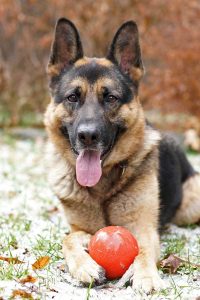
Milo
GSRNE places dogs in these six New England states (ME, NH, VT, MA, CT, RI). We cannot support long distance adoptions. If you are from outside New England, you may want to search on other GSD websites for information on GSD rescue groups throughout North America.
If any of the following situations apply to you, it is unlikely that you will qualify to adopt from GSRNE: We regret that some good homes may be passed up because of these requirements, but we feel that this policy is best for everybody involved taking the dog and family’s safety into account.
- Homes that do NOT have a physically secure fenced area (minimum 5′ high) of at least 1000 sq. ft. (ex: 20×50) that is attached to the home so when the back or side door is opened, the dog goes directly into the fenced area.
- Homes with children under the age of 7 years, whether the children live in the home or are regular visitors.
- Applicants that rent their place of residence.
If any of the above apply to your situation and you would still like to talk with someone on our Adoption Hotline Team about your situation. Please leave your name and phone number, along with a convenient time to return your call. It is important that you speak slowly and clearly so GSRNE can call you back. We try to return all calls within 48 hours.
NOTE: If you do not receive a callback within 48 hours, please call back. This means that your number wasn’t clear enough to understand. When the volunteer calls back, they will go over our requirements for adoption as well as answer any questions you might have. It’s a good idea to write down your questions so you won’t forget.
Click here to go to our Requirements for Adoption page for additional details.
After you have spoken to an Adoption Hotline Volunteer, they will send you an application (if you meet the requirements for adoption). Read every bit of the Adoption Application packet that you receive. This packet is complete with information about both GSDs in general and about adoption and how that works.
Have A Home Visit Done
Once the application is accepted, a GSRNE Home Visitor Volunteer will call you and make an appointment to visit your home to discuss the needs of a rescue German Shepherd dog with you and your family. Usually we can get this visit done within a few weeks of your application approval. This volunteer will sit down and meet with you, and check the safety of your property, etc. This is great time to ask questions, voice concerns, discuss what you love in a dog, what you would rather avoid, etc.
NOTE: We cannot “reserve” certain dogs for you to meet. Completion of the adoption application and home visit interview begins the adoption process and helps us determine which dog in our program matches best with you and your family.
We reserve the right to refuse an application if the home situation or environment is deemed incompatible with the needs of our rescue German Shepherd dog. Our requirements have been set through years of experience placing and rehoming rescue dogs. Our emphasis is on the dogs’ needs. Disqualification does not mean the prospective adopter would not be a good home, but that the situation does not meet our dogs’ best interest.
Meet the Dog!
If approved, the Adoption Coordinator will help you set up an adoption visitation appointment with the dog’s foster home to meet the GSRNE dog who best matches your family’s profile and requirements. Because GSRNE has all of our dogs living in nice foster homes, not in kennels, we do not have a facility for you to visit. GSDs do NOT do well in shelter situations, so we make sure that they are placed in a foster home until we can find a matched approved adopter for them.
This is the best way to meet a new dog. You will see how the dog lives and behaves in a home environment. Exclusive time is set aside by the foster home to be with you and your family, so that you can focus on the rescue dog you are meeting without the distractions or stress of kennel/shelter situations, or short-handed staff. You can ask whatever questions you want about the dog from the foster home that has lived with this rescue dog for over a month. Your visit can be a relaxed and pleasant experience where you and the rescue dog are the focus.
Visitations to meet a dog may be set up right away, or can take some time, depending on the availability of dog(s) that match your needs and lifestyle.
Make Your Decision
After meeting the dog that seemed to match with your requirements, it’s decision time! If there is a connection, the actual adoption begins. If the match just isn’t quite right, we’ll figure out why, add that criteria to the search, find another dog who may make a better match, and another visit will be scheduled. Because we take great care to find a dog that will match your lifestyle and preferences, it rarely takes meeting more than one, possibly two dogs, to find that ultimate new family member!
The adoption donation is $450 for dogs over 6 months up to 7 years of age, $550 for puppies up to 6 months of age and $250 for Seniors age 8 and older or “Special Needs” dogs. These donations help to defray the rescue’s boarding and veterinary expenses, but does not cover the entire expense we incur for each dog.
This adoption donation covers the following:
- Spay or neuter
- Microchip
- Heartworm, Lyme, Elrichea, and Anaplasma (4DX) test, where available, on dogs over 6 months
- Distemper, Hepatitis, Leptospirosis, Parainfluenza and Parvovirus (DHLPP) vaccination
- Rabies vaccination (dogs over 16 weeks)
- Lyme vaccination
- Fecal check and basic worming, if needed
- Blood panel for senior dogs to check vital organ functioning, or dogs with obvious health issues
- Treatment of any other health issue
- Isolation and health certificate fees if needed to bring the dog into rescue
- Leash
- Collar
- The dog’s favorite toy
- A complimentary one-year membership to German Shepherd Rescue of New England, Inc., which includes a subscription to the GSRNE newsletter.
Our organization is comprised wholly of hard-working volunteers whose only reward is seeing these wonderful German Shepherd dogs in loving homes, given another chance for a happy life. We will try to match you with a devoted, loving, loyal companion. Thank you for your interest!
Please Remember
We are all volunteers, most of whom work full-time day jobs, have our own dogs and families, and are doing this out of a desire to make a difference in the lives of needy German Shepherds. We appreciate your patience while we work through the Adoption process.
READ NEXT: Before You Adopt
Our Adoption Process
GSRNE places dogs in these six New England states (ME, NH, VT, MA, CT, RI). We cannot support long distance adoptions. If you are from outside New England, you may want to search elsewhere for information on other GSD rescue groups throughout North America.
If any of the following situations apply to you, it is unlikely that you will qualify to adopt from GSRNE: We regret that some good homes may be passed up because of these requirements, but we feel that this policy is best for everybody involved taking the dog and family’s safety into account.
-
- Homes that do NOT have a physically secure fenced area (minimum 5′ high) of at least 1000 sq. ft. (ex: 20×50) that is attached to the home so when the back or side door is opened, the dog goes directly into the fenced area.
- Homes with children under the age of 7 years, whether the children live in the home or are regular visitors.
- Applicants that rent their place of residence.
If any of the above apply to your situation and you would still like to talk with someone on our Adoption Hotline Team about your situation. Please leave your name and phone number, along with a convenient time to return your call. It is important that you speak slowly and clearly so GSRNE can call you back. We try to return all calls within 48 hours.
NOTE: If you do not receive a callback within 48 hours, please call back. This means that your number wasn’t clear enough to understand. When the volunteer calls back, they will go over our requirements for adoption as well as answer any questions you might have. It’s a good idea to write down your questions so you won’t forget.
Click here to see our Requirements for Adoption section for additional details.
After you have spoken to an Adoption Hotline Volunteer, they will send you an application (if you meet the requirements for adoption). Read every bit of the Adoption Application packet that you receive. This packet is complete with information about both GSDs in general and about adoption and how that works.
Have A Home Visit Done
Once the application is accepted, a GSRNE Home Visitor Volunteer will call you and make an appointment to visit your home to discuss the needs of a rescue German Shepherd dog with you and your family. Usually we can get this visit done within a few weeks of your application approval. This volunteer will sit down and meet with you, and check the safety of your property, etc. This is great time to ask questions, voice concerns, discuss what you love in a dog, what you would rather avoid, etc.
NOTE: We cannot “reserve” certain dogs for you to meet. Completion of the adoption application and home visit interview begins the adoption process and helps us determine which dog in our program matches best with you and your family.
We reserve the right to refuse an application if the home situation or environment is deemed incompatible with the needs of our rescue German Shepherd dog. Our requirements have been set through years of experience placing and rehoming rescue dogs. Our emphasis is on the dogs’ needs. Disqualification does not mean the prospective adopter would not be a good home, but that the situation does not meet our dogs’ best interest.
Meet the Dog!
If approved, the Adoption Coordinator will help you set up an adoption visitation appointment with the dog’s foster home to meet the GSRNE dog who best matches your family’s profile and requirements. Because GSRNE has all of our dogs living in nice foster homes, not in kennels, we do not have a facility for you to visit. GSDs do NOT do well in shelter situations, so we make sure that they are placed in a foster home until we can find a matched approved adopter for them.
This is the best way to meet a new dog. You will see how the dog lives and behaves in a home environment. Exclusive time is set aside by the foster home to be with you and your family, so that you can focus on the rescue dog you are meeting without the distractions or stress of kennel/shelter situations, or short-handed staff. You can ask whatever questions you want about the dog from the foster home that has lived with this rescue dog for over a month. Your visit can be a relaxed and pleasant experience where you and the rescue dog are the focus.
Visitations to meet a dog may be set up right away, or can take some time, depending on the availability of dog(s) that match your needs and lifestyle.
Make Your Decision
After meeting the dog that seemed to match with your requirements, it’s decision time! If there is a connection, the actual adoption begins. If the match just isn’t quite right, we’ll figure out why, add that criteria to the search, find another dog who may make a better match, and another visit will be scheduled. Because we take great care to find a dog that will match your lifestyle and preferences, it rarely takes meeting more than one, possibly two dogs, to find that ultimate new family member!
Our organization is comprised wholly of hard-working volunteers whose only reward is seeing these wonderful German Shepherd dogs in loving homes, given another chance for a happy life. We will try to match you with a devoted, loving, loyal companion. Thank you for your interest!
____
If you’re unable to adopt or it is not for you, there’s other ways you can help one of GSRNE’s rescue dogs – you can Foster, Donate, become a Member or Volunteer, and/or join our Buddy Program.
Please remember, we are all volunteers, most of whom work full-time day jobs, have our own dogs and families, and are volunteering out of a desire to make a difference in the lives of needy German Shepherds. We appreciate your patience while we work through the Adoption Process.
